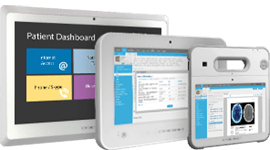Healthcare
Success Stories & Case Studies
The unique needs of the healthcare industry require specialized computer hardware beyond the scope of most every other industry. We invite you to take a few moments to review some of our most recent success stories and learn how our partners are using Cybernet's medical computers to make processes more efficient, save money and improve patient care.
 Challenge
Challenge
UWH was experiencing hardware failures in the computers running their patient monitoring system. They knew they needed a change and had a specific set of requirements. Most importantly, they needed a Power over Ethernet computer.
 Solution
Solution
Having already worked with Cybernet Manufacturing on a previous deployment of medical computers for their anesthesia carts, UWH turned to their trusted partner for a solution. That solution was the CyberMed M12.
 Results
Results
After working out some initial hiccups, UWH has reported zero hardware failures with the Cybernet units. The nurses love the reliability of the units as well as the aesthetic appeal of the white medical grade units on the ward.
 Challenge
Challenge
After a decade in the field, Lifelines Neuro was looking to upgrade their Trackit V at-home EEG device to utilize a more robust tablet. There were a number of specifications that needed to be met in order to be approved for use.
 Solution
Solution
The medical grade certification of the CyberMed Rx, with its rugged build for at-home users, was the perfect combination. A powerful Intel processor and Windows 10 operating system helped seal the deal.
 Results
Results
Lifelines had no trouble navigating the regulatory challenges of bringing an updated device to market thanks to Cybernet's vast experience in the field. The rugged construction has also reduced damaged units in the field.
 Challenge
Challenge
ID Solutions needed to find a hardware partner that understood the healthcare space and could provide them with a medical grade device to power their turnkey telemedicine carts.
 Solution
Solution
After initially using a different hardware manufacturer, ID Solutions began getting calls complaining about the reliability of the devices. They quickly began evaluating other manufacturers and settled on the CyberMed NB22.
 Results
Results
The reliability issues that end-users reported quickly ceased once ID Soultions switched over to Cybernet devices. In fact, the roll-out of the Medsitter has been so successful that IS Solutions has expanded their product line.
 Challenge
Challenge
Intramedical Imaging was updating their cutting edge device, the Node Seeker 2000. They needed to find a medical grade tablet capable of powering the device that would help them earn MDSAP certification for global distribion.
 Solution
Solution
After struggling with the bulkiness and slow processing speed of a different tablet, Intramedical was contacted by Cybernet. After demoing the CyberMed T10C medical tablet it became immediately clear that this was their solution.
 Results
Results
Intramedical Imaging was able to earn MDSAP (Medical Device Single Audit Program) certification, allowing them to distribute globally. They are now looking to expand the functionality of the device into robotic surgery.
 Challenge
Challenge
Endotronix was looking for a "brain" to run their PA Pressure Sensor System. They needed a medical grade computer that could help them pass FDA approval with a number of other must have features built in for a successful trial.
 Solution
Solution
After evaluating a number of manufacturers, Endotronix found that only one device, the CyberMed S22 checked off every single box on their must have list. This would be the critical piece in developing their new device.
 Results
Results
Since deploying the CyberMed S22 units throughout their clinical trial sites, the team at Endotronix has been impressed with its success. So much so that Endotronix has already started swapping out old hardware with Cybernet.
 Challenge
Challenge
Regional Medical Center of San Jose was looking to replace the laptops they were using for their barcode medical administration workflows. They needed better battery life and a bigger screen at an affordable price.
 Solution
Solution
The team at Regional chose the CyberMed XB22 medical grade monitor because it could power their mini PCs and barcode scanners while still being compatible with their non-powered cart solution.
 Results
Results
In addition to meeting all of their initial needs, the medical grade housing and IP65 rating proved to be a godsend when the COVID-19 pandemic hit, helping to keep clinicians and patients safer.
 Challenge
Challenge
Midwest Health was experiencing massive failure rates of the computers mounted on their medication dispensing carts. They needed to find a medical grade replacement that was more reliable.
 Solution
Solution
After hearing promises from their previous vendor that they had fixed all of the issues, problems persisted, so Midwest Health did their own research and found the CyberMed NB22. This unit checked all of the boxes.
 Results
Results
The staff has seen zero failures from the units, and the fact that they are medical grade and can be disinfected have been incredibly useful during the COVID-19 pandemic. Staff is very happy with their new computers.
 Challenge
Challenge
Flashback Technologies had created an algorithm to help clinicians better predict outcomes of patients who had suffered traumatic blood loss. They needed a hardware partner that could bring this technology into the field.
 Solution
Solution
They found a partner in Cybernet that could not only provide them with a medical grade mobile solution, but also took a lot of the logistics off of their plate as well, allowing them to focus on developing life saving technology.
 Results
Results
Through clinical trials, the devices have been a tremendous success in both military and civilian environments. Flashback is in the process of developing additional functionality of their technology with Cybernet as their partner.
